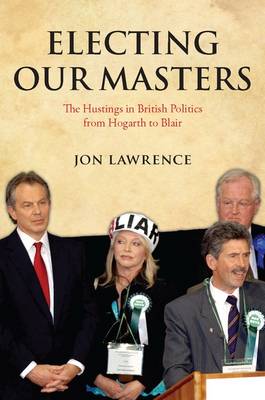Jon Lawrence is a Senior Lecturer in Modern British Political History at Cambridge University, and is particularly interested in politics as a site of interaction between politicians and the public. He is the author of Electing Our Masters: the Hustings in British Politics from Hogarth to Blair. In the original post below, he looks at how the spirit of the hustings is being kept alive during the election campaign by the Internet and the UK’s first televised Prime Ministerial debate, which aired last week. You can read more by Jon Lawrence here.
The spirit of the hustings has brought British politicians face-to-face with an irreverent, questioning public for centuries. It is arguably the most distinctive and valuable feature of our electoral culture, but it is not one that political parties can be trusted to keep alive in the internet age. It is no accident that Gordon Brown switches off the  comments function on his YouTube postings, or that most of the free-comment facilities on the Conservatives’ innovative WebCameron site were switched off after its first 8 months. But for all that, the 2010 election has already shown encouraging signs that the spirit of the hustings is alive and well in British politics. For sure, the role of the public has been tightly circumscribed in the televised leadership debates, but there is still a clear recognition that, as the rules put it, ‘the audience is a key element of the programmes and has to be seen by the viewers’. The audience may not be allowed to applaud, let alone heckle, but their presence is central to the theatre of these debates. It was striking in the first debate how, as the leaders warmed-up, so they got better at answering questions directly and personally (in turn this allowed ITV to focus more closely on audience reaction since one of the 76 rules governing these broadcasts stipulates that ‘if one of the leaders directly addresses an individual audience member, a close-up shot of that individual can be shown’). Nick Clegg not only appeared the most comfortable with this intimate style of politics, but he also pushed it furthest –notably by addressing most of the questioners by name in his 90 second peroration. Although David Cameron has spent much of the last two years criss-crossing the country addressing open meetings of voters in key marginal constituencies, it was Clegg who appeared instinctively to understand the power of the hustings to re-connect politics (and politicians) with the public. Of course it helped that he could play his ‘plague on both your houses’ card, but this was made more credible by his mastery of the old arts of the hustings.
comments function on his YouTube postings, or that most of the free-comment facilities on the Conservatives’ innovative WebCameron site were switched off after its first 8 months. But for all that, the 2010 election has already shown encouraging signs that the spirit of the hustings is alive and well in British politics. For sure, the role of the public has been tightly circumscribed in the televised leadership debates, but there is still a clear recognition that, as the rules put it, ‘the audience is a key element of the programmes and has to be seen by the viewers’. The audience may not be allowed to applaud, let alone heckle, but their presence is central to the theatre of these debates. It was striking in the first debate how, as the leaders warmed-up, so they got better at answering questions directly and personally (in turn this allowed ITV to focus more closely on audience reaction since one of the 76 rules governing these broadcasts stipulates that ‘if one of the leaders directly addresses an individual audience member, a close-up shot of that individual can be shown’). Nick Clegg not only appeared the most comfortable with this intimate style of politics, but he also pushed it furthest –notably by addressing most of the questioners by name in his 90 second peroration. Although David Cameron has spent much of the last two years criss-crossing the country addressing open meetings of voters in key marginal constituencies, it was Clegg who appeared instinctively to understand the power of the hustings to re-connect politics (and politicians) with the public. Of course it helped that he could play his ‘plague on both your houses’ card, but this was made more credible by his mastery of the old arts of the hustings.
And what of the internet? Is all the hype about the virtual election justified, and, perhaps more importantly, has the web restored spontaneous, irreverent interaction to British politics? Well it’s trying, but there’s still a long way to go. There is no doubt that both the media and party activists are hooked on the internet campaign, but


